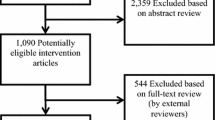Abstract
Self-help programs are an effective intervention for parents of children with externalizing behavior. A number of studies have shown that self-administered parent training has positive short-term effects on a child’s behavior, but there is little research done on long-term outcomes. This paper reports results from a 1-year follow-up of a randomized controlled prevention trial of self-administered parent training with minimal therapist contact. In the initial prevention trial, we randomly assigned 48 preschool children with elevated levels of externalizing behavior to either a treatment group (TG) or a waitlist control group (WLC). The intervention consisted of written material and brief weekly telephone consultations. Thirty-six families (25 TG families, 11 WLC families) completed the self-help program. Twenty-five of these participated in a follow-up assessment 1 year after the intervention. There were no significant changes from post-test to follow-up on measures of child behavior (e.g., Attention-Deficit/Hyperactivity Disorder and Oppositional Defiant Disorder symptom rating scales) and parental mental health, indicating that gains achieved post-intervention were maintained for at least 1 year. Moreover, the percentage of children with substantial behavior problems was reduced from pre-intervention to follow-up. These findings provide evidence that telephone-assisted self-help programs can be effective in the prevention of disruptive behavior problems.

Similar content being viewed by others
References
Achenbach, T. M., & Rescorla, L. A. (2001). Manual for the ASEBA school-age forms & profiles. Burlington: University of Vermont.
Baker, C. N., Arnold, D. H., & Meagher, S. (2011). Enrollment and attendance in a parent training prevention program for conduct problems. Prevention Science, 12, 126–138.
Bouchard, S., Gervais, J., Gagnier, N., & Loranger, C. (2013). Evaluation of a primary prevention program for anxiety disorders using story books with children aged 9–12 years. Journal of Primary Prevention, 34, 345–359.
Campbell, S. B., Shaw, D. S., & Gilliom, M. (2000). Early externalizing behavior problems: Toddlers and preschoolers at risk for later maladjustment. Development and Psychopathology, 12, 467–488.
Döpfner, M., Görtz-Dorten, A., Lehmkuhl, G., Breuer, D., & Goletz, H. (2008). Diagnostik-System für psychische Störungen nach ICD-10 und DSM-IV für Kinder und Jugendliche-II (DISYPS-II). Bern: Huber.
Döpfner, M., Schürmann, S., & Lehmkuhl, G. (2011). Wackelpeter & Trotzkopf. Hilfen für Eltern bei ADHS-Symptomen, hyperkinetischem und oppositionellem Verhalten (4th ed.). Weinheim: Beltz.
Hanisch, C., Freund-Braier, I., Hautmann, C., Jänen, N., Plück, J., Brix, G., … Döpfner, M. (2010). Detecting effects of the indicated prevention Programme for Externalizing Problem behaviour (PEP) on child symptoms, parenting, and parental quality of life in a randomized controlled trial. Behavioural and Cognitive Psychotherapy, 38, 95–112.
Hanisch, C., Hautmann, C., Plück, J., Eichelberger, I., & Döpfner, M. (2014). The prevention program for externalizing problem behavior (PEP) improves child behavior by reducing negative parenting: Analysis of mediating processes in a randomized controlled trial. Journal of Child Psychology and Psychiatry, 55, 473–484.
Kierfeld, F., Ise, E., Hanisch, C., Görtz-Dorten, A., & Döpfner, M. (2013). Effectiveness of telephone-assisted parent-administered behavioural family intervention for preschool children with externalizing problem behaviour: A randomized controlled trial. European Child & Adolescent Psychiatry, 22, 553–565.
Lovibond, S. H., & Lovibond, P. F. (1995). Manual for the Depression Anxiety Stress Scales (2nd ed.). Sydney: Psychology Foundation of Australia.
Lucia, S., & Dumas, J. E. (2013). Entre-parents: Initial outcome evaluation of a preventive-parenting program for French-speaking parents. Journal of Primary Prevention, 34, 135–146.
McGrath, P. J., Lingley-Pottie, P., Thurston, C., MacLean, C., Cunningham, C., Waschbusch, D. A., … Chaplin, W. (2011). Telephone-based mental health interventions for child disruptive behavior or anxiety disorders: Randomized trials and overall analysis. Journal of the American Academy of Child & Adolescent Psychiatry, 50, 1162–1172.
O’Brien, M., & Daley, D. (2011). Self-help parenting interventions for childhood behaviour disorders: A review of the evidence. Child: Care, Health and Development, 37, 623–637.
Pearl, E. S. (2009). Parent management training for reducing oppositional and aggressive behavior in preschoolers. Aggression and Violent Behavior, 14, 295–305.
Plück, J., Beiling, M., Hautmann, C., Kuschel, A., Heinrichs, N., Schmeck, K., & Döpfner, M. (2013). Die Erfassung von Verhaltensauffälligkeiten im Vorschulalter mit dem Elternfragebogen für Klein- und Vorschulkinder (CBCL/1½-5) [Assessment of behavior problems in preschool children using the German version of CBCL/1½-5]. Diagnostica, 59, 155–166.
Sanders, M. R., Bor, W., & Morawska, A. (2007). Maintenance of treatment gains: A comparison of enhanced, standard, and self-directed Triple P—Positive Parenting Program. Journal of Abnormal Child Psychology, 35, 983–998.
Sanders, M. R., Dittman, C. K., Farruggia, S. P., & Keown, L. J. (2014). A comparison of online versus workbook delivery of a self-help Positive Parenting Program. Journal of Primary Prevention, 35, 125–133.
Strayhorn, J. M., & Weidman, C. S. (1988). A parent practices scale and its relation to parent and child mental health. Journal of the American Academy of Child & Adolescent Psychiatry, 27, 613–618.
Tarver, J., Daley, D., Lockwood, J., & Sayal, K. (2014). Are self-directed parenting interventions sufficient for externalising behaviour problems in childhood? A systematic review and meta-analysis. European Child & Adolescent Psychiatry. doi:10.1007/s00787-014-0556-5
Acknowledgments
We would like to thank all the children and their parents for participating in this study.
Conflict of interest
Manfred Döpfner is the author of the self-help book “Wackelpeter & Trotzkopf” on which the intervention was based. He receives royalties from the publisher.
Author information
Authors and Affiliations
Corresponding author
Rights and permissions
About this article
Cite this article
Ise, E., Kierfeld, F. & Döpfner, M. One-Year Follow-Up of Guided Self-Help for Parents of Preschool Children With Externalizing Behavior. J Primary Prevent 36, 33–40 (2015). https://doi.org/10.1007/s10935-014-0374-z
Published:
Issue Date:
DOI: https://doi.org/10.1007/s10935-014-0374-z




